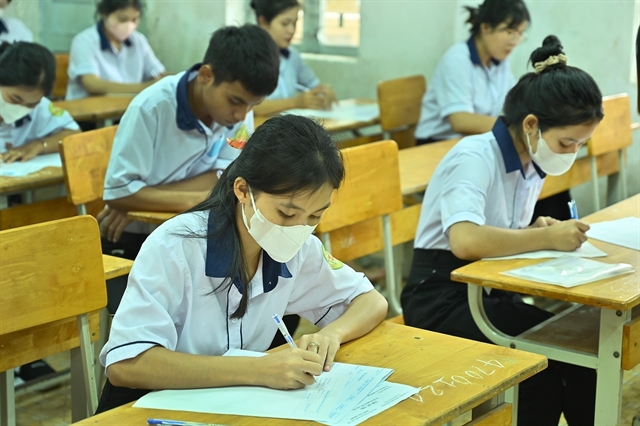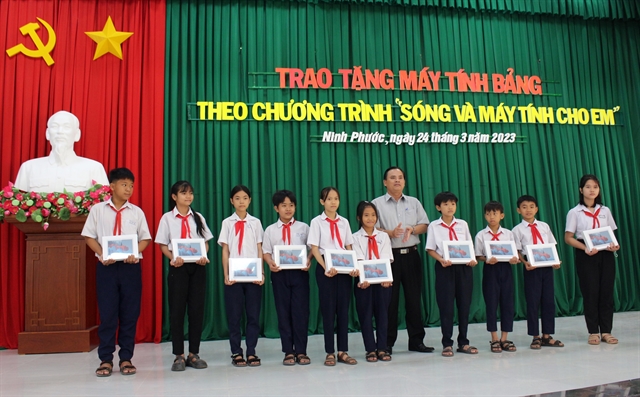 Society
Society

 |
| High school students in an exam in Phan Thiết City, the southern province of Bình Thuận. — VNA/VNS Photo Nguyễn Thanh |
HÀ NỘI — After 10 years of implementing Resolution 29-NQ/TW, Việt Nam's education and training system has had important changes with innovations in awareness and ideological viewpoints to policies, methods and training content.
The participation of families, communities and learners themselves through good learning models deployed by the Việt Nam Association for Learning Promotion (VALP) has bolstered the spirit of learning towards building a learning society and lifelong learning.
This is also the Party’s strategy, as comprehensive innovation in education and training is important for societal development nowadays.
With efforts over the past 10 years, the VALP has made important contributions to education and training.
Lifelong learning
Recently, associations for learning promotion at all levels have coordinated with the education sector to successfully implement the Prime Minister's decision on building learning models and promoting social learning models in the country.
These models motivate people to enthusiastically study based on the motto: learn to know, learn to do, learn to live together and learn to be human.
This is especially important as the fourth industrial revolution is having a strong impact on all elements of the socio-economy in Việt Nam.
According to Deputy chairman and general secretary of the VALP Lê Mạnh Hùng, learning models are the basic foundation, where all people, from students to adults, retired people and the elderly, have the opportunity to learn through non-formal educational institutions.
In recent years, the VALP has worked with the Ministry of Education and Training to develop community learning centres, promote open educational resources, and innovate teaching and learning methods.
Currently, informal educational institutions such as community learning centres, vocational training facilities at communes and wards, worker training schools in enterprises, cultural houses, libraries and clubs have formed a widespread learning network.
A rich open educational resource creates opportunities for adults to participate in learning, self-study, and lifelong learning.
From just studying in class at schools, now people can study both directly and online, study anywhere, study whatever they need and study while working.
Creating opportunities
In recent times, contributions of social resources to form study and talent promotion funds have been conducted in most localities across the country.
Every year, millions of poor students are awarded scholarships at all levels.
Dozens of thousands of rewards are given to both adults and students with excellent academic achievements.
In addition to scholarships and study promotion rewards, the VALP also has other forms of support such as building bridges in mountainous areas connecting schools and residential living areas, and giving computers to help students learn online during the COVID-19 pandemic.
In the past three years, the VALP organised a scholarship programme "Learning never ends" following late President Hồ Chí Minh's teachings.
The scholarships are awarded on the late President’s birthday, May 19, in all 63 provinces and cities to adults and students with excellent achievements, and even elderly people in their 80s and 90s.
They have motivated generations of Vietnamese people from the mountains to the lowlands to go to school and created an exciting and competitive atmosphere to learn.
Challenges
Deputy Chairman Hùng said that the biggest difficulty was the incorrect concept about "adult education" that was quite common among some educational administrators and educational policy makers.
Many people believe that "adult education" is not as important as "children's education".
Concepts of "non-formal education" are often overlooked compared to "formal education".
"In fact, initial education only takes about 17 years in school whereas non-formal education takes place long-term, helping to train human resources at companies and improve the qualifications of workers," said Hùng.
According to Hùng, currently, Việt Nam does not have enough synchronous laws regulating the scale and system of continuing education development.
Each locality has different ways of doing things, lacking a unified direction nationwide.
In addition, some localities arbitrarily merged the learning promotion association with other associations that do not have the same mission.
Efforts
 |
| Giving tablets to outstanding students in Ninh Phước District, the southern province of Ninh Thuận. — VNA/VNS Photo Công Thử |
Learning is a fundamental element of culture and education is the foundation of culture. The VALP believes that the Ministry of Culture, Sports and Tourism needs to research cultural models, integrating the title "Learning Family" into the title "Cultural Family", because a cultural family must first be a learning family.
"Continuing education is a national policy, placing people in lifelong education from birth to death. The Ministry of Education and Training needs to pay more attention to continuing education and planning policies on educational development for adults," said Hùng.
Hùng suggested localities associate the campaign "The whole country emulates to build a learning society, promoting lifelong learning" with the goal of comprehensive innovation in education and training.
Community learning centres and educational institutions for adults needed appropriate investment in human resources and technical facilities to be suitable learning places, meeting the needs and aspirations of the people.
In the coming time, to promote the functions of community learning centres, associations for learning promotion at all levels will advise local Party committees and authorities to strengthen management through information technology.
Concerned organisations will work together to hold training programmes at the centres to teach information technology skills, new labour skills and foreign languages for young farmers and rural workers, helping them have opportunities to increase income and start their own business.
The VALP will also coordinate with the culture sector to expand library services for readers, widen learning materials systems to practically serve the needs of each individual and family.
It will guide colleges and universities to build a public learning materials system to meet the diverse learning needs of adults.
Associations at all levels continue to grow various types of study promotion funds, campaigns, and awards in a diverse direction, supporting many people with learning opportunities.
They will incorporate the model of learning citizens, learning families and learning companies into working programmes of agencies, organisations, unions, and businesses to serve lifelong learning and build a learning society. — VNS




